2 sept 2015
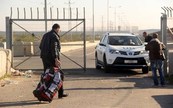
Israeli Occupation Forces (IOF) rounded up a Palestinian trader from Khan Younis in the southern Gaza Strip after summoning him for investigation at Beit Hanoun (Erez) crossing.
Local sources told the PIC reporter that the IOF soldiers arrested trader Tamer al-Berrim, 36, after being summoned to be questioned by Israeli intelligence at the crossing. He trades in construction materials.
The sources revealed that Berrim was arrested despite the fact that he possessed a pass permit via Beit Hanoun crossing.
The forces arrested about 12 merchants and summoned others in the past months. The last one arrested was Sami al-Batesh from Khan Younis.
Local sources told the PIC reporter that the IOF soldiers arrested trader Tamer al-Berrim, 36, after being summoned to be questioned by Israeli intelligence at the crossing. He trades in construction materials.
The sources revealed that Berrim was arrested despite the fact that he possessed a pass permit via Beit Hanoun crossing.
The forces arrested about 12 merchants and summoned others in the past months. The last one arrested was Sami al-Batesh from Khan Younis.
1 sept 2015
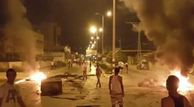
Israeli soldiers continued, on Tuesday at dawn, their invasion into the Jenin refugee camp, in the northern part of the occupied West Bank, and fired missiles into two homes, before demolishing a store and several walls. The invasion into the camp started on Monday evening.
During the invasion, the soldiers kidnapped a former political prisoner, his mother, his son and his brother.
The soldiers fired two "Energa" shells targeting two homes in the refugee camp, before demolishing a store and several walls, surrounding the home of former political prisoner Majdi Abu al-Haija, who was taken prisoner after the soldiers also kidnapped his mother, his son Soheib, 18, and his brother ‘Ala.
A Civil Defense medic said the soldiers prevented the medics and ambulances from approaching the targeted homes, especially the home of Abu al-Haija.
He added that the wife of Abu al-Haija suffered fractures in one of her legs, and that the soldiers also invaded and occupied several surrounding homes.
Eyewitnesses said clashes took place between the soldiers and dozens of local youths, who hurled stones and empty bottles on them, and that armed resistance fighters also exchanged fire with the invading forces.
Sounds of loud explosions were also heard in the area, while military helicopters hovered overhead.
The Israeli army said one soldier suffered a moderate-to- severe injury, and was moved to Rambam Israeli Hospital in Haifa.
On Monday evening, soldiers kidnapped a Palestinian, identified as Mershed ‘Obeid Sabarna, 21, after stopping him on a military roadblock at the main entrance of his town, Beit Ummar, north of the southern West Bank city of Hebron.
During the invasion, the soldiers kidnapped a former political prisoner, his mother, his son and his brother.
The soldiers fired two "Energa" shells targeting two homes in the refugee camp, before demolishing a store and several walls, surrounding the home of former political prisoner Majdi Abu al-Haija, who was taken prisoner after the soldiers also kidnapped his mother, his son Soheib, 18, and his brother ‘Ala.
A Civil Defense medic said the soldiers prevented the medics and ambulances from approaching the targeted homes, especially the home of Abu al-Haija.
He added that the wife of Abu al-Haija suffered fractures in one of her legs, and that the soldiers also invaded and occupied several surrounding homes.
Eyewitnesses said clashes took place between the soldiers and dozens of local youths, who hurled stones and empty bottles on them, and that armed resistance fighters also exchanged fire with the invading forces.
Sounds of loud explosions were also heard in the area, while military helicopters hovered overhead.
The Israeli army said one soldier suffered a moderate-to- severe injury, and was moved to Rambam Israeli Hospital in Haifa.
On Monday evening, soldiers kidnapped a Palestinian, identified as Mershed ‘Obeid Sabarna, 21, after stopping him on a military roadblock at the main entrance of his town, Beit Ummar, north of the southern West Bank city of Hebron.
31 aug 2015

The Palestinian Prisoner Center for Studies said the Israeli occupation army recently started again to kidnap Palestinian merchants from the Gaza Strip at Beit Hanoun (Erez) crossing after a four-month hiatus.
Spokesman for the center Riyadh al-Ashqar stated on Sunday that the Israeli army had launched a ferocious arrest campaign against Gazan merchants and businessmen in the first third of the current year, during which 21 of them were taken prisoners at Beit Hanoun crossing.
Ashqar added that most of those detainees are still in Israeli jails on allegations of smuggling banned materials and cooperating with resistance factions in Gaza.
This arrest campaign stopped from April until the end of July before it started again with the kidnapping of three merchants during August, he said.
Spokesman for the center Riyadh al-Ashqar stated on Sunday that the Israeli army had launched a ferocious arrest campaign against Gazan merchants and businessmen in the first third of the current year, during which 21 of them were taken prisoners at Beit Hanoun crossing.
Ashqar added that most of those detainees are still in Israeli jails on allegations of smuggling banned materials and cooperating with resistance factions in Gaza.
This arrest campaign stopped from April until the end of July before it started again with the kidnapping of three merchants during August, he said.
30 aug 2015
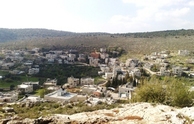
Ongoing Israeli drilling works, including detonation of rocks, near the village of Wadi Fukin, to the west of Bethlehem, may put the lives of nearby Palestinians at risk, according to village mayor Ahmad Sukkar.
Sukkar said, recently, that renewed drilling work by the Israeli authorities in the area also involve the use of heavy explosives to detonate rocks. This, according to him, has put the lives of many Palestinians as well as their properties and homes at risk, as a great amount of stone shrapnel splattered and fell near homes during detonation of rocks.
According to WAFA, the mayor also said that detonations work have badly affected water resources in and outside the village, and the outcomes are much worse given the nature of the village and the fact it relies heavily on agriculture.
The village is just close to Beitar Illit illegal settlement, one of the largest and most rapidly growing Israeli settlements in the West Bank. The settlement was established in 1984 on the lands of the Palestinian village of Husan.
Settlement activities in the Occupied Palestinian Territories and the Golan Heights, both occupied since 1967, are considered illegal under international law.
The settler population in the West Bank is estimated at 531,000: in the late 2012 the population of the West Bank settlements reached 341,400 while in the late 2011 there were 190,423 individuals living in Israeli neighborhoods in East Jerusalem.
B’Tselem the Israeli human rights group said, “The settlements have been allocated vast areas, far exceeding their built-up sections. These areas have been declared closed military zones by military orders and are off limits to Palestinians, except by special permit. In contrast, Israeli citizens, Jews from anywhere in the world and tourists may all freely enter these areas.”
Sukkar said, recently, that renewed drilling work by the Israeli authorities in the area also involve the use of heavy explosives to detonate rocks. This, according to him, has put the lives of many Palestinians as well as their properties and homes at risk, as a great amount of stone shrapnel splattered and fell near homes during detonation of rocks.
According to WAFA, the mayor also said that detonations work have badly affected water resources in and outside the village, and the outcomes are much worse given the nature of the village and the fact it relies heavily on agriculture.
The village is just close to Beitar Illit illegal settlement, one of the largest and most rapidly growing Israeli settlements in the West Bank. The settlement was established in 1984 on the lands of the Palestinian village of Husan.
Settlement activities in the Occupied Palestinian Territories and the Golan Heights, both occupied since 1967, are considered illegal under international law.
The settler population in the West Bank is estimated at 531,000: in the late 2012 the population of the West Bank settlements reached 341,400 while in the late 2011 there were 190,423 individuals living in Israeli neighborhoods in East Jerusalem.
B’Tselem the Israeli human rights group said, “The settlements have been allocated vast areas, far exceeding their built-up sections. These areas have been declared closed military zones by military orders and are off limits to Palestinians, except by special permit. In contrast, Israeli citizens, Jews from anywhere in the world and tourists may all freely enter these areas.”
27 aug 2015
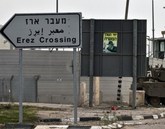
The Israeli occupation forces (IOF) last Tuesday kidnapped a Palestinian merchant from Khan Younis after he arrived at Beit Hanoun (Erez) crossing, north of the Gaza Strip, in order to enter the West Bank on a business trip.
An informed source told the Palestinian Information Center (PIC) that the family of 54-year-old Sami Tabesh lost contact with him last Tuesday before it was told the next day that he was taken prisoner by Israeli border soldiers at Beit Hanoun crossing.
The source added that Tabesh, who has a small business trading in watches and plastic bags, had obtained a permit from the Israeli authorities to cross into the West Bank.
About 12 Gazan businessmen were kidnapped and many others were summoned for interrogation by the Israeli occupation army during the past few months.
An informed source told the Palestinian Information Center (PIC) that the family of 54-year-old Sami Tabesh lost contact with him last Tuesday before it was told the next day that he was taken prisoner by Israeli border soldiers at Beit Hanoun crossing.
The source added that Tabesh, who has a small business trading in watches and plastic bags, had obtained a permit from the Israeli authorities to cross into the West Bank.
About 12 Gazan businessmen were kidnapped and many others were summoned for interrogation by the Israeli occupation army during the past few months.
26 aug 2015
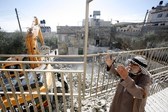
The Israeli occupation bulldozers on Wednesday morning knocked down residential and commercial structures in Jerusalem’s town of al-Izriya under the pretext of unlicensed construction.
Activist Hani Halabiyeh said the Israeli occupation forces (IOF), escorted by civil administration crews, rolled into al-Izriya area, and knocked down residential and commercial structures owned by Sami Abu Ghalya without prior notifications.
According to Halabiyeh the demolition process targeted a junk shop, a grocery store, a car laundry and a number of residential buildings.
The Israeli bulldozes knocked down Abu Ghalya’s 100-square-meter home and another 20-square-meter home, along with seven commercial structures covering an overall area of seven donums, he added.
He added that the Israeli occupation authorities demolished the same structures for the fifth time, forcing at least six family members to live on the streets and preventing 15 families from earning a living for their children.
Local sources estimated the losses at over 6,000 shekels (amounting to US$1,560) in total.
Activist Hani Halabiyeh said the Israeli occupation forces (IOF), escorted by civil administration crews, rolled into al-Izriya area, and knocked down residential and commercial structures owned by Sami Abu Ghalya without prior notifications.
According to Halabiyeh the demolition process targeted a junk shop, a grocery store, a car laundry and a number of residential buildings.
The Israeli bulldozes knocked down Abu Ghalya’s 100-square-meter home and another 20-square-meter home, along with seven commercial structures covering an overall area of seven donums, he added.
He added that the Israeli occupation authorities demolished the same structures for the fifth time, forcing at least six family members to live on the streets and preventing 15 families from earning a living for their children.
Local sources estimated the losses at over 6,000 shekels (amounting to US$1,560) in total.
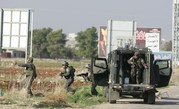
Palestinian workers complained of the Israeli tight restrictions they face at Jalama checkpoint while trying to reach their work places within 1948 occupied territories.
The workers have submitted Tuesday a complaint letter to the Trade Unions in Jenin, calling for ending their suffering at Jalama checkpoint.
They pointed out that they are routinely subjected to humiliation at the hands of Israeli soldiers although they have Israeli permits to cross into the occupied territories.
The suffering of Palestinian workers has been doubled since an Israeli private company took control over Jalama checkpoint.
The workers have submitted Tuesday a complaint letter to the Trade Unions in Jenin, calling for ending their suffering at Jalama checkpoint.
They pointed out that they are routinely subjected to humiliation at the hands of Israeli soldiers although they have Israeli permits to cross into the occupied territories.
The suffering of Palestinian workers has been doubled since an Israeli private company took control over Jalama checkpoint.
24 aug 2015

The Ministry of Health in the Gaza Strip, on Monday, said that four main hospitals may shut down within the next few hours, due to a lack of fuel needed to run them.
According to the PNN, spokesman for the Ministry of Health in Gaza, Dr. Ashraf Al-Qudra, said that Al-Shifa Hospital, Kamal Adwan Hospital, Gaza European Hospital and Al-Rantisi Hospital for Children are threatened to stop working in the coming hours.
On his Facebook page, Dr. Al-Qudra wrote yesterday that the four hospitals are threatened to shut down and stop working shortly, because the fuel in their electrical generators is running out.
According to the PNN, spokesman for the Ministry of Health in Gaza, Dr. Ashraf Al-Qudra, said that Al-Shifa Hospital, Kamal Adwan Hospital, Gaza European Hospital and Al-Rantisi Hospital for Children are threatened to stop working in the coming hours.
On his Facebook page, Dr. Al-Qudra wrote yesterday that the four hospitals are threatened to shut down and stop working shortly, because the fuel in their electrical generators is running out.
22 aug 2015
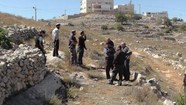
Israeli Occupation Forces (IOF) prevented Palestinian farmers from accessing or working in their lands located to the south of Beit Ummar town in northern al-Khalil.
Local sources revealed that Israeli forces were deployed in large numbers in Palestinians’ lands adjacent to the Jewish settlement, Karmi Tsur, established by force on Beit Ummar and Halhoul lands.
The Palestinian farmers were barred from getting access to their lands under false security pretenses, the sources pointed out.
The sources said that the Israeli forces have been banning Palestinians from entering their own farms since the beginning of August. Meanwhile, Karmi Tsur settlement has been expanding whereas Jewish settlers continue storming Palestinian lands in the region under the protection of Israeli forces.
Local sources revealed that Israeli forces were deployed in large numbers in Palestinians’ lands adjacent to the Jewish settlement, Karmi Tsur, established by force on Beit Ummar and Halhoul lands.
The Palestinian farmers were barred from getting access to their lands under false security pretenses, the sources pointed out.
The sources said that the Israeli forces have been banning Palestinians from entering their own farms since the beginning of August. Meanwhile, Karmi Tsur settlement has been expanding whereas Jewish settlers continue storming Palestinian lands in the region under the protection of Israeli forces.
18 aug 2015
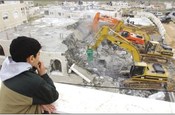
Israeli military bulldozers conducted a large-scale demolition operation of scores of Palestinian houses in east of Occupied Jerusalem on Monday.
The representative of Abu al-Nowar neighborhood Daoud Jahalin said, in a press statement, that the Israeli army and Special Forces surrounded Beer al-Maskoup on Jericho-Jerusalem road for hours in the morning and started razing seven Palestinian facilities.
Quarrels occurred between Israeli forces and Palestinians due to barring the latter, along with pressmen, from approaching their properties after announcing the location as a closed military zone.
The Palestinian residents said the demolition operation was carried out without any prior notice in full disregard of a court resolution to the contrary.
The spokesman of Jahalin Arabs revealed that Israeli vehicles demolished 18 facilities in other three locations including stockyards, tents and houses.
“The Israeli authorities seek to displace and deport us by force for the benefit of settlement projects, but we are steadfast in our lands”, he said.
Palestinians have been living in these housing complexes for decades. They depend on grazing sheep for making their living and have no other places to live in. Israel intends to displace them for settlement expansion.
The representative of Abu al-Nowar neighborhood Daoud Jahalin said, in a press statement, that the Israeli army and Special Forces surrounded Beer al-Maskoup on Jericho-Jerusalem road for hours in the morning and started razing seven Palestinian facilities.
Quarrels occurred between Israeli forces and Palestinians due to barring the latter, along with pressmen, from approaching their properties after announcing the location as a closed military zone.
The Palestinian residents said the demolition operation was carried out without any prior notice in full disregard of a court resolution to the contrary.
The spokesman of Jahalin Arabs revealed that Israeli vehicles demolished 18 facilities in other three locations including stockyards, tents and houses.
“The Israeli authorities seek to displace and deport us by force for the benefit of settlement projects, but we are steadfast in our lands”, he said.
Palestinians have been living in these housing complexes for decades. They depend on grazing sheep for making their living and have no other places to live in. Israel intends to displace them for settlement expansion.
17 aug 2015
On top of that, Palestinian fisherman are harassed by the Israeli navy on a daily basis; their boats are fired upon, sunk and confiscated, and the fishermen themselves are often arrested if they are not killed or wounded in the process. All of this, of course, has an impact on the amount of fish caught off the Gaza coast, which should be a rich fishing ground. Catching more and larger fish requires sailing into international waters, as fishermen from other countries do.
Palestinian investors in Gaza have thus resorted to fish farming. Speaking to MEMO, Yasser Al-Haj said that he invested in this sector for personal gain as well as to ease the crisis in the Palestinian market. Although it is not regarded as a solution to the crisis, it can alleviate it.
Al-Haj's newly-opened fish farm only produces one type of fish, sea bream. It is imported from Israel and then raised in this farm and others. He says that his farm produces 7 per cent of the Gaza Strip's needs and sells about 250kg a day. One kilo of sea bream costs about $12.
For an ordinary middle-class citizen, this price is high, but for a poor citizen it is very expensive, given the average income in the Gaza Strip. The high price is set by many factors, including the price of fish feed from Israel, which is $1,850 per tonne, plus the issue of the power cuts suffered across the territory.
Fish farms require generators to keep the oxygen moving and water pumping continuously in the ponds. Yasser Al-Haj notes that he is unable to breed the fish in the sea because of pollution, which poses a danger to the fish and people who eat them. The sewage processing plants aren't working due to the power cuts and lack of maintenance resulting from the Israeli blockade.
Palestinian investors in Gaza have thus resorted to fish farming. Speaking to MEMO, Yasser Al-Haj said that he invested in this sector for personal gain as well as to ease the crisis in the Palestinian market. Although it is not regarded as a solution to the crisis, it can alleviate it.
Al-Haj's newly-opened fish farm only produces one type of fish, sea bream. It is imported from Israel and then raised in this farm and others. He says that his farm produces 7 per cent of the Gaza Strip's needs and sells about 250kg a day. One kilo of sea bream costs about $12.
For an ordinary middle-class citizen, this price is high, but for a poor citizen it is very expensive, given the average income in the Gaza Strip. The high price is set by many factors, including the price of fish feed from Israel, which is $1,850 per tonne, plus the issue of the power cuts suffered across the territory.
Fish farms require generators to keep the oxygen moving and water pumping continuously in the ponds. Yasser Al-Haj notes that he is unable to breed the fish in the sea because of pollution, which poses a danger to the fish and people who eat them. The sewage processing plants aren't working due to the power cuts and lack of maintenance resulting from the Israeli blockade.
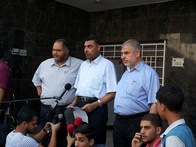
The Palestinian Ministry of Health in Gaza sounded distress signals over an imminent health crisis to rock the besieged Strip.
Dr. Ashraf al-Qudra, the Health Ministry spokesman in Gaza, said: "The serious health crisis has reached unprecedented levels; the Ministry lacks the work requirements of human and material resources after a whole year since the unity government has come to power."
He added in a press conference held on Sunday at al-Shifa hospital in Gaza: "The current situation is the worst in the Ministry's history in light of the unity government's negligence of its responsibilities. Food, treatment, medicine, and all patients' basic needs aren't met."
Al-Qudra held the unity government fully responsible for the sharp decline in the Ministry's services, which increases the patients' suffering to a large extent and threatens their lives.
When asked about whether there are communications with foreign parties to salvage the health situation in Gaza, Dr. al-Qudra said: "We are in constant contact with Arab and Muslim donors and with the international community; in order to prevent a serious health crisis in Gaza, but until this moment we are still waiting for a moral stance to emerge in support of the Palestinian people."
The spokesman regretted that due to such conditions, the ministry was forced to terminate essential health services.
Al-Qudra charged that the unity government in Ramallah has deprived the health ministry – Gaza branch of its allocations which do not exceed 12% of the ministry's medicines and the medical disposables. He also mentioned the unity government's rejection to pay the salaries of the medical workers in Gaza.
"The government is depriving the patients of their simplest rights which warns of an unprecedented catastrophe. We are facing a huge challenge to provide the Gazan patients with the badly needed medical services," the spokesman said.
Al-Qudra pointed to the total lack of 154 kinds of medicine, which poses a deficit of 32% of the essential medicines, “especially for patients of Hemophilia, thalassemia, cancer, chronic and blood diseases in addition to a remarkable shortage of the vaccines and antibiotics which increased the rate of patients transferred abroad for treatment by 100% for the first time."
He added that the government is ignoring the need for filling job vacancies in the health facilities which has dangerous implications on the health sector in the blockaded enclave.
Services reduction
Al-Qudra pointed out that the Health Ministry in Gaza had to reduce its ambulance and transport services due to the lack of fuel, explaining that there is an acute shortage of diesel used for generators at hospitals.
He held the Israeli occupation responsible for the deteriorated health conditions in Gaza; as it insists on its unjust siege, crossings' closure, and on depriving the Gazans of their basic human and health rights.
He called on the international community, health organizations, and human rights institutions to take a practical and urgent action to lift the illegal blockade of Gaza once and for all.
The spokesman called on the Egyptian authorities to open the Rafah crossing for medical aid convoys and to allow the patients to travel so as to receive medical treatment in the Egyptian hospitals.
Dr. Ashraf al-Qudra, the Health Ministry spokesman in Gaza, said: "The serious health crisis has reached unprecedented levels; the Ministry lacks the work requirements of human and material resources after a whole year since the unity government has come to power."
He added in a press conference held on Sunday at al-Shifa hospital in Gaza: "The current situation is the worst in the Ministry's history in light of the unity government's negligence of its responsibilities. Food, treatment, medicine, and all patients' basic needs aren't met."
Al-Qudra held the unity government fully responsible for the sharp decline in the Ministry's services, which increases the patients' suffering to a large extent and threatens their lives.
When asked about whether there are communications with foreign parties to salvage the health situation in Gaza, Dr. al-Qudra said: "We are in constant contact with Arab and Muslim donors and with the international community; in order to prevent a serious health crisis in Gaza, but until this moment we are still waiting for a moral stance to emerge in support of the Palestinian people."
The spokesman regretted that due to such conditions, the ministry was forced to terminate essential health services.
Al-Qudra charged that the unity government in Ramallah has deprived the health ministry – Gaza branch of its allocations which do not exceed 12% of the ministry's medicines and the medical disposables. He also mentioned the unity government's rejection to pay the salaries of the medical workers in Gaza.
"The government is depriving the patients of their simplest rights which warns of an unprecedented catastrophe. We are facing a huge challenge to provide the Gazan patients with the badly needed medical services," the spokesman said.
Al-Qudra pointed to the total lack of 154 kinds of medicine, which poses a deficit of 32% of the essential medicines, “especially for patients of Hemophilia, thalassemia, cancer, chronic and blood diseases in addition to a remarkable shortage of the vaccines and antibiotics which increased the rate of patients transferred abroad for treatment by 100% for the first time."
He added that the government is ignoring the need for filling job vacancies in the health facilities which has dangerous implications on the health sector in the blockaded enclave.
Services reduction
Al-Qudra pointed out that the Health Ministry in Gaza had to reduce its ambulance and transport services due to the lack of fuel, explaining that there is an acute shortage of diesel used for generators at hospitals.
He held the Israeli occupation responsible for the deteriorated health conditions in Gaza; as it insists on its unjust siege, crossings' closure, and on depriving the Gazans of their basic human and health rights.
He called on the international community, health organizations, and human rights institutions to take a practical and urgent action to lift the illegal blockade of Gaza once and for all.
The spokesman called on the Egyptian authorities to open the Rafah crossing for medical aid convoys and to allow the patients to travel so as to receive medical treatment in the Egyptian hospitals.
16 aug 2015
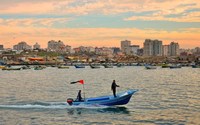
When Hamas demanded establishing a waterway as a precondition for a truce deal with Israel after the notorious Israeli 51-day-aggression on Gaza, some activists and factions mocked this rightful precondition; however, the pipe dream has become an achievable and fair demand.
Muin Rajab, a professor of Economics at al-Azhar University in Gaza, said that a seaport that connects Gaza with the external world is very important, and pointed out that Oslo accords endorse the Palestinian right to establish a waterway but the project hasn't been implemented because of the Israeli procrastination.
Rajab said in a statement to the PIC that establishing the waterway is a positive step and that it is the result of the Palestinians' steadfastness after the last Israeli aggression on the besieged coastal enclave.
He also highlighted the economic benefits of meeting the long-held Palestinian demand of establishing a seaport and that it will replace the Israeli-controlled Ashdod port.
The economist charged that the Israeli Occupation Authorities (IOA) imposes high taxes on the goods passing to the Palestinian territories especially to Gaza and that Gaza seaport will solve this issue which will positively affect the Palestinian economy.
Spokesman for the European campaign to end the siege on Gaza Rami Abdo pointed to the fact that the European Parliament adopted a decision supporting Gaza’s right of harbor and waterway in 2010.
The "Euro-Mediterranean with the participation of French and Dutch experts submitted a full plan of Gaza seaport project to the European Commission, the Turkish president Recep Erdogan, PA, and deputy head of Hamas's political bureau Ismail Haneyya," Abdo elaborated.
He posted on his Facebook page: "Many Palestinian factions in Gaza mocked Hamas's precondition for a ceasefire and considered it a distant dream. The precondition was also slammed by the PA."
Media talked about Israel's approval of establishing a watercourse connecting Gaza with Cyprus as a result of the talks between Hamas and former Middle East Quartet Envoy Tony Blair to lift the unjust siege imposed on Gaza and to stabilize the ceasefire.
Hamas refused to officially reveal specific results of the meetings with Blair; however, Hamas spokesman Sami Abu Zuhri said that his Movement has held meetings with various Palestinian factions including Fatah so as to brief them on the talks with the European and international parties including the meetings with Blair regarding breaking the Gaza blockade.
"Any proposal submitted to Hamas Movement will be presented to the Palestinian factions," Abu Zuhri stressed, and denied the groundless idea of establishing a state in Gaza or separating it from the other Palestinian territories.
Construction of Gaza seaport
According to the 2004 UNCTAD report, the deep-water Gaza seaport was planned to be built on a site some 5 kilometers south of Gaza city, around 200 kilometers west of Amman, and to service not only Palestinian traders but also Jordanian traders, providing them with an alternative transit corridor to Europe and North America.
Future plans include expanding the port's capacity to handle large vessels of up to 50,000 to 70,000 DWT, and linking its facilities to the neighboring ports of Port Said in Egypt, Ashdod, Beirut, and Cyprus.
In addition to the seaport, the project design also included other infrastructure and facilities, such as an electrical substation, communication system, water supply system, surface water drainage system, waste disposal facility, storage facilities, transportation plan, and access roads.
Phase 1 includes the construction of facilities such as a 200 meters cargo quay and a Ro-Ro terminal; water depth will be 11 meters to enable vessels of up to 30 000 DWT to enter the port. The port will also be supplied with a 730 meters breakwater.
Presumably, during this phase, loading and unloading will be performed by shipboard cranes. It will be recommended for the coming years to have mobile cranes bearing 10-30 tons each.
Phase 2 includes the ability to extend Phase 1 easily and without major investments with regards to maritime security premises so as to meet future needs in Gaza.
Phases 3 and 4 include the ability to extend the exterior parameter of the port to cope with the shipping process of the West Bank, Jordan, and other countries of the area.
The port area extends over 323 meters south of Sheikh Ejleen road up to the north of the coastal road south of Sheikh Ejleen village southwest of Gaza City.
Muin Rajab, a professor of Economics at al-Azhar University in Gaza, said that a seaport that connects Gaza with the external world is very important, and pointed out that Oslo accords endorse the Palestinian right to establish a waterway but the project hasn't been implemented because of the Israeli procrastination.
Rajab said in a statement to the PIC that establishing the waterway is a positive step and that it is the result of the Palestinians' steadfastness after the last Israeli aggression on the besieged coastal enclave.
He also highlighted the economic benefits of meeting the long-held Palestinian demand of establishing a seaport and that it will replace the Israeli-controlled Ashdod port.
The economist charged that the Israeli Occupation Authorities (IOA) imposes high taxes on the goods passing to the Palestinian territories especially to Gaza and that Gaza seaport will solve this issue which will positively affect the Palestinian economy.
Spokesman for the European campaign to end the siege on Gaza Rami Abdo pointed to the fact that the European Parliament adopted a decision supporting Gaza’s right of harbor and waterway in 2010.
The "Euro-Mediterranean with the participation of French and Dutch experts submitted a full plan of Gaza seaport project to the European Commission, the Turkish president Recep Erdogan, PA, and deputy head of Hamas's political bureau Ismail Haneyya," Abdo elaborated.
He posted on his Facebook page: "Many Palestinian factions in Gaza mocked Hamas's precondition for a ceasefire and considered it a distant dream. The precondition was also slammed by the PA."
Media talked about Israel's approval of establishing a watercourse connecting Gaza with Cyprus as a result of the talks between Hamas and former Middle East Quartet Envoy Tony Blair to lift the unjust siege imposed on Gaza and to stabilize the ceasefire.
Hamas refused to officially reveal specific results of the meetings with Blair; however, Hamas spokesman Sami Abu Zuhri said that his Movement has held meetings with various Palestinian factions including Fatah so as to brief them on the talks with the European and international parties including the meetings with Blair regarding breaking the Gaza blockade.
"Any proposal submitted to Hamas Movement will be presented to the Palestinian factions," Abu Zuhri stressed, and denied the groundless idea of establishing a state in Gaza or separating it from the other Palestinian territories.
Construction of Gaza seaport
According to the 2004 UNCTAD report, the deep-water Gaza seaport was planned to be built on a site some 5 kilometers south of Gaza city, around 200 kilometers west of Amman, and to service not only Palestinian traders but also Jordanian traders, providing them with an alternative transit corridor to Europe and North America.
Future plans include expanding the port's capacity to handle large vessels of up to 50,000 to 70,000 DWT, and linking its facilities to the neighboring ports of Port Said in Egypt, Ashdod, Beirut, and Cyprus.
In addition to the seaport, the project design also included other infrastructure and facilities, such as an electrical substation, communication system, water supply system, surface water drainage system, waste disposal facility, storage facilities, transportation plan, and access roads.
Phase 1 includes the construction of facilities such as a 200 meters cargo quay and a Ro-Ro terminal; water depth will be 11 meters to enable vessels of up to 30 000 DWT to enter the port. The port will also be supplied with a 730 meters breakwater.
Presumably, during this phase, loading and unloading will be performed by shipboard cranes. It will be recommended for the coming years to have mobile cranes bearing 10-30 tons each.
Phase 2 includes the ability to extend Phase 1 easily and without major investments with regards to maritime security premises so as to meet future needs in Gaza.
Phases 3 and 4 include the ability to extend the exterior parameter of the port to cope with the shipping process of the West Bank, Jordan, and other countries of the area.
The port area extends over 323 meters south of Sheikh Ejleen road up to the north of the coastal road south of Sheikh Ejleen village southwest of Gaza City.

